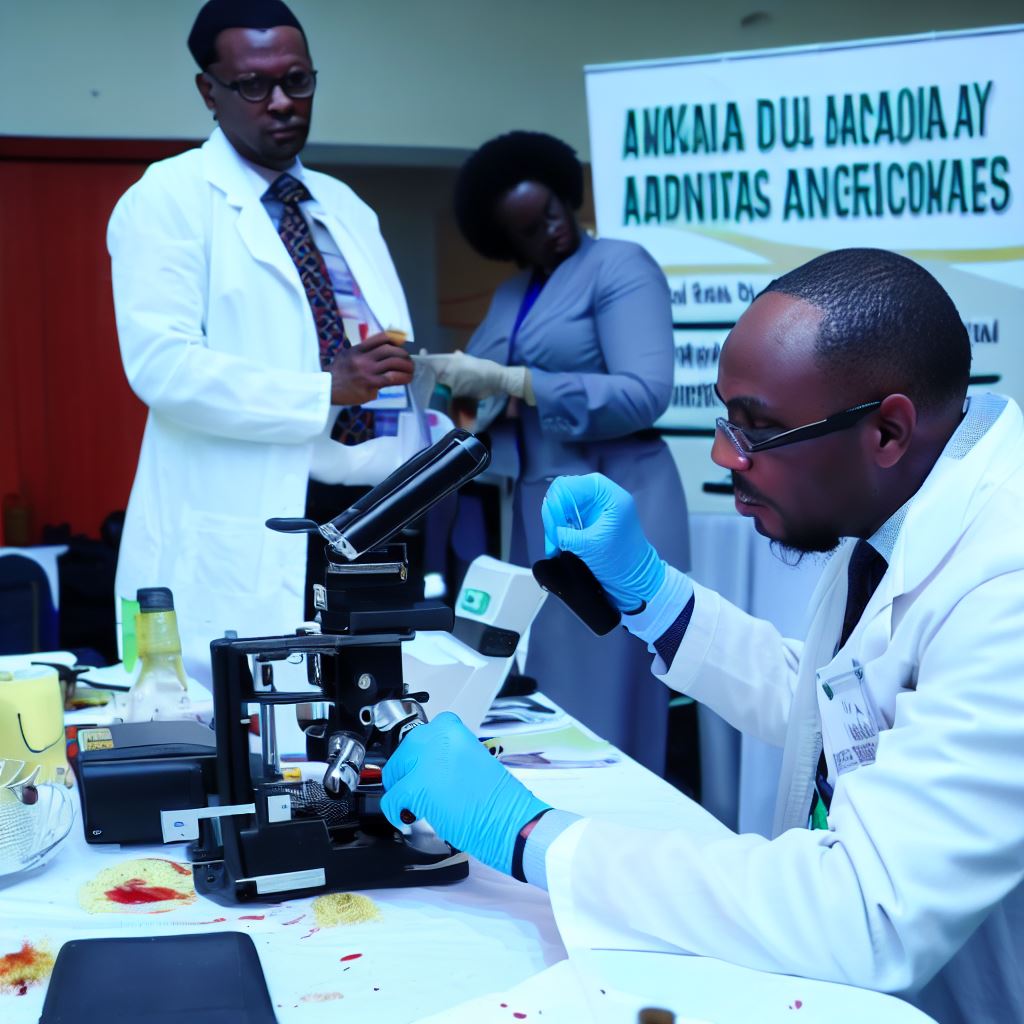Introduction
Forensic pathology, the study of diseases and injuries for legal purposes, plays a crucial role in criminal investigations.
International partnerships in this field are essential for Nigeria to enhance its forensic capabilities and address the challenges it faces.
Cooperation with other countries enables knowledge sharing, training opportunities, and resource mobilization, ultimately improving the quality and efficiency of forensic services in Nigeria.
Forensic pathology involves the investigation of suspicious deaths, identification of causes of death, and presentation of evidence in courts.
It helps establish the circumstances surrounding a death, aiding the judicial process.
However, Nigeria currently faces various challenges in this field, including inadequate infrastructure, limited resources, and a shortage of trained professionals.
International partnerships can provide valuable support in addressing these challenges.
Collaboration with foreign universities, organizations, and experts can facilitate training programs and knowledge exchange.
Through such partnerships, Nigerian forensic pathologists can acquire advanced skills and techniques, enabling them to conduct more accurate and comprehensive autopsies.
Additionally, international partnerships can help improve the infrastructure and technology available in Nigerian forensic laboratories.
Sharing resources with other countries allows for the procurement of state-of-the-art equipment and supplies, enhancing the efficiency and reliability of forensic investigations.
Furthermore, international partnerships help establish global standards and best practices in forensic pathology.
Nigeria can learn from the experiences and expertise of other countries, implementing internationally accepted guidelines and protocols.
This ensures that forensic investigations conducted in Nigeria meet global standards, increasing the credibility and acceptance of forensic evidence in legal proceedings.
International partnerships play a crucial role in advancing forensic pathology in Nigeria.
Collaborating with other countries promotes knowledge sharing, capacity building, and resource mobilization.
By leveraging these partnerships, Nigeria can enhance its forensic capabilities and overcome the challenges it currently faces.
Background of forensic pathology in Nigeria
Definition and role of forensic pathology
- Forensic pathology is a branch of medicine that involves determining the cause of death and investigating crime scenes.
- Forensic pathologists play a crucial role in the criminal justice system by providing expert opinions based on scientific evidence.
State of forensic pathology in Nigeria
- Nigeria has made significant progress in the field of forensic pathology in recent years.
- The Nigerian government has recognized the importance of forensic pathology in solving crimes and seeking justice.
- Efforts have been made to establish forensic laboratories and training programs to enhance the capabilities of forensic pathologists.
- However, the resources and infrastructure in Nigeria are not yet at an optimal level, hindering the full development of forensic pathology.
Challenges faced by forensic pathologists in Nigeria
- Inadequate funding and limited resources have been major challenges in the advancement of forensic pathology in Nigeria.
- Shortage of trained forensic pathologists has resulted in a lack of expertise and delays in autopsy examinations.
- The absence of standardized protocols and procedures has also impeded the effectiveness of forensic investigations.
- There is a need for collaborative efforts between Nigerian forensic pathologists and international partners to address these challenges.
International partnerships in forensic pathology in Nigeria
1. Importance of international partnerships
- International partnerships bring expertise, resources, and knowledge from developed countries to support the development of forensic pathology in Nigeria.
- Collaboration with international organizations and experts can help in capacity building, training, and infrastructure development.
2. Initiatives and programs
- Several initiatives and programs have been undertaken to foster international partnerships in forensic pathology in Nigeria.
- Training workshops, seminars, and exchange programs have been organized to enhance the skills and knowledge of Nigerian forensic pathologists.
- International organizations have provided financial assistance and technical support in establishing and maintaining forensic laboratories.
3. Benefits of international partnerships
- International partnerships have improved the quality and accuracy of forensic investigations in Nigeria.
- Access to advanced technology and modern equipment has enhanced the efficiency and effectiveness of autopsy procedures.
- International collaborations have also facilitated the sharing of best practices and standardization of protocols in forensic pathology.
- The increased capacity and capability of Nigerian forensic pathologists have contributed to the swift resolution of criminal cases.
International partnerships play a vital role in the development of forensic pathology in Nigeria.
Despite the challenges faced by forensic pathologists in the country, collaborations with international organizations and experts have brought significant improvements.
Read: Oil and Gas Industry: Geologists’ Roles in Nigeria
Benefits of international partnerships in forensic pathology
Knowledge and expertise sharing
- International partnerships allow for the sharing of knowledge and expertise in forensic pathology.
- Experts from different countries can exchange ideas, techniques, and best practices.
- This sharing of knowledge leads to the improvement of forensic pathology practices in Nigeria.
Access to advanced technology and equipment
- International partnerships provide access to advanced technology and equipment.
- Advanced equipment enhances the accuracy and efficiency of forensic pathology investigations.
- Nigeria can benefit from the latest technological advancements in the field through these partnerships.
Training and capacity building opportunities
- International partnerships offer training and capacity building opportunities for forensic pathologists in Nigeria.
- Experts from partner countries can provide specialized training to Nigerian professionals.
- This improves the skills and knowledge of local forensic pathologists, leading to higher quality services.
Improved quality of forensic pathology services
- International partnerships contribute to the overall improvement in the quality of forensic pathology services in Nigeria.
- Through collaborations with experts, Nigerian forensic pathologists can adopt international standards and practices.
- Enhanced quality assurance measures lead to more reliable and accurate forensic pathology investigations.
Improving the quality of forensic pathology services requires a multifaceted approach involving education, technology, collaboration, and oversight.
Read: Environmental Geology Careers in Nigeria: Opportunities
Case studies: Successful international partnerships in forensic pathology in Nigeria
Partnership with United Kingdom
- Goals and objectives of the partnership: Enhance the capacity and expertise of Nigerian forensic pathologists. Improve the quality and efficiency of forensic pathology services in Nigeria.
- Outcomes and achievements: Training programs conducted by UK experts resulted in improved skills of Nigerian pathologists. Implementation of modern forensic techniques and methodologies in Nigerian laboratories.
- Lessons learned and best practices: Regular communication and open dialogue between partners are key for successful collaboration. Flexibility and adaptability to local context are crucial for effective implementation. Long-term commitment is essential to ensure sustainability and continuous improvement.
Partnership with United States
- Goals and objectives of the partnership: Strengthen the forensic pathology infrastructure in Nigeria. Enhance the capacity of Nigerian forensic pathologists in the areas of forensic investigations and evidence collection.
- Outcomes and achievements: Establishment of well-equipped forensic laboratories in Nigeria with support from US partners. Training and mentorship programs resulted in increased expertise and professionalism among Nigerian pathologists. Improvement in the accuracy and reliability of forensic pathology services in Nigeria.
- Lessons learned and best practices: Strong institutional support and collaboration are crucial for the success of international partnerships. Regular evaluation and monitoring of progress help identify areas for improvement. Building sustainable networks and relationships is essential for long-term impact.
Regular communication and diplomacy are essential for maintaining and strengthening such partnerships.
Read: Epidemiology and Ethics: Navigating Complex Issues in Nigeria
Challenges and Limitations of International Partnerships in Forensic Pathology
Political and Bureaucratic Hurdles
- International partnerships frequently face political obstacles and bureaucratic red tape.
- Negotiating agreements between different countries can be a complicated and time-consuming process.
- Dealing with various government agencies and officials may lead to delays and challenges.
- The alignment of political interests and priorities can also pose difficulties in establishing partnerships.
- Political instability and changes in government can disrupt ongoing international collaborations.
Cultural and Language Barriers
- Differences in language and culture can hinder effective communication and understanding.
- Translation services may be required to bridge the gap between forensic pathologists of different nationalities.
- Varied cultural practices and perspectives might affect the approach to forensic investigations and evidence handling.
- Misinterpretation of cultural practices can lead to misunderstandings and conflicts.
- Establishing mutual respect and intercultural competence is essential for successful collaboration.
Financial Constraints
- Limited funding and resources often constrain international partnerships in forensic pathology.
- Insufficient financial support can hinder the implementation of planned collaborative projects.
- Expensive forensic equipment and training programs may be unaffordable for developing countries like Nigeria.
- Disparities in funding capacities among partnering countries can create imbalances and inequities.
- Seeking alternative sources of funding and advocating for increased investment is crucial for sustainability.
Sustainability and Long-term Impact Assessment
- Ensuring the sustainability of international partnerships in forensic pathology is challenging.
- Dependency on external expertise and resources can hinder long-term capacity-building efforts.
- Transferring knowledge and skills to local professionals is essential for sustained progress.
- Maintaining continuous communication and engagement between partner institutions is crucial for success.
- Effective monitoring and evaluation mechanisms are necessary to assess the long-term impact of collaborations.
International partnerships in forensic pathology in Nigeria face various challenges and limitations.
Political and bureaucratic hurdles, cultural and language barriers, financial constraints, and sustainability issues can hinder the implementation and success of such collaborations.
Overcoming these challenges requires effective communication, cultural understanding, financial support, and long-term planning.
Despite the obstacles, international partnerships can play a crucial role in enhancing forensic pathology capabilities and improving justice systems in Nigeria.
Read: Job Markets: Where to Find Epidemiology Jobs in Nigeria Today

Uncover the Details: Women in Science: Profiles of Nigerian Female Scientists
See Related Content: Mapping the Future: Cartography as a Career in Nigeria
Recommendations for enhancing international partnerships in forensic pathology in Nigeria
Strengthening government support and policies
Forensic pathology is a critical field in criminal investigations and justice systems worldwide.
In Nigeria, enhancing international partnerships in this domain is imperative.
To achieve this, our government must take proactive steps.
Firstly, Nigeria should invest in state-of-the-art forensic facilities and training programs to attract foreign experts and foster knowledge exchange.
This active approach will elevate the country’s reputation in the field.
Secondly, government policies should streamline international collaborations by reducing bureaucratic hurdles.
Simplifying visa processes for foreign experts and providing incentives for partnerships will encourage their involvement.
Furthermore, the government should allocate adequate funding to support research, technological advancements, and infrastructure development.
Facilitating networking and collaboration platforms
In the dynamic field of forensic pathology, collaboration and networking are the cornerstones of progress.
Nigeria, with its growing interest in advancing forensic pathology, is primed for international partnerships that can accelerate its development.
Active networking platforms play a pivotal role in connecting forensic pathologists across borders.
By sharing knowledge, best practices, and cutting-edge research, these platforms facilitate continuous learning and growth.
International partnerships, nurtured through active collaboration, open doors to advanced training, access to modern forensic tools, and global expertise.
These partnerships are invaluable in addressing Nigeria’s unique forensic challenges, such as improving evidence handling, enhancing autopsy techniques, and supporting law enforcement agencies.
Moreover, they can aid in establishing standardized protocols and certifications, raising the quality of forensic services in the country.
Investing in education and research initiatives
Investing in education and research initiatives is the key to enhancing international partnerships in forensic pathology in Nigeria.
Active collaboration with global experts can bolster the country’s forensic capabilities and strengthen its justice system.
Nigerian universities and institutions must prioritize forensic pathology education and research.
This will equip local professionals with cutting-edge knowledge and skills, making them valuable partners on the international stage.
Research initiatives should focus on tackling the unique challenges faced in Nigeria, such as unidentified bodies from conflicts and disasters.
By actively seeking solutions, we can contribute to global forensic knowledge.
Nigerian institutions should provide scholarships and grants for individuals pursuing forensic pathology education and research.
Engaging in diplomatic efforts to attract international support
In the pursuit of advancing forensic pathology in Nigeria, the nation has embarked on a proactive diplomatic journey to secure international support.
These efforts are not just commendable but essential for fostering international partnerships in this critical field.
Nigeria recognizes that collaboration with other nations is pivotal for enhancing its forensic pathology capabilities.
Active diplomacy is at the forefront of this mission, as Nigerian officials engage with foreign counterparts and organizations to garner support.
Through diplomatic channels, Nigeria has sought technical assistance, knowledge transfer, and resource-sharing agreements.
This active engagement has already yielded positive results, with several countries pledging their support.
These partnerships promise to bring in expertise, training opportunities, and advanced technologies to bolster Nigeria’s forensic pathology capabilities.
Nigerian government should actively reach out to international organizations and seek their support in developing forensic pathology capabilities.
Conclusion
Importance of international partnerships in forensic pathology
International partnerships in forensic pathology play a crucial role in Nigeria, aiding the development of forensic pathology systems.
Enhancing investigation and crime solving techniques, and improving the overall justice system.
This collaboration provides opportunities for knowledge exchange, capacity building, and exposure to new technology and techniques.
These partnerships contribute to the growth and professional development of forensic pathologists.
Through international partnerships, Nigerian forensic pathologists gain access to training programs, workshops, and conferences, allowing them to acquire new skills and stay updated with global best practices.
This ultimately enhances their abilities in conducting post-mortem examinations, interpreting findings, and providing expert testimony in courtrooms.
Final thoughts on the future prospects of international partnerships in Nigeria
International partnerships in forensic pathology in Nigeria have a promising future.
As more collaborations are established, the country’s forensic pathology system will continue to improve, leading to more accurate investigations, fair trials, and justice for victims and their families.
It is essential for the government and stakeholders to invest in these partnerships and create a conducive environment for international collaboration.
By doing so, Nigeria can benefit from the expertise and experience of international forensic pathologists, strengthening its own forensic pathology capacities and contributing to the global advancement of the field.




